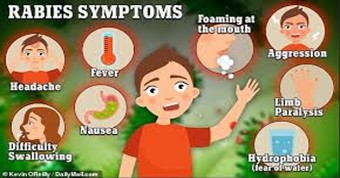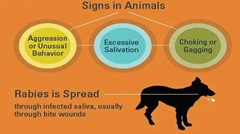Animal Bites and Rabies
Rabies is a fatal but preventable viral disease. The rabies virus infects the central nervous system of mammals and is expressed in their saliva. The typical transmission route is through a bite or scratch from an infected animal. In rare cases people have been infected through saliva contact with pre-existing wounds or abrasions. Petting a rabid animal and having contact with their blood or feces are typically not considered rabies exposure.
Signs of Rabies:
Fever or headache, but quickly changes to central nervous system signs, such as confusion, sleepiness or agitation.
What types of animals can pass rabies to people?
Only mammals can pass rabies to people. Wild animals are much more likely than domestic animals to carry rabies, especially bats, raccoons, skunks, foxes, and coyotes. Bats are the primary carriers of rabies in Mason County. However, dogs, cats, cows, or any mammal can pass rabies to people. If you are bitten by any animal, you should thoroughly wash the wound as soon as possible and consult your health care provider to discuss the need for further treatment.


When traveling abroad, avoid contact with wild animals and be especially careful around dogs in developing countries. Rabies is common in parts of Asia, Africa, and Latin America where many dogs are infected with rabies. Tens of thousands of people die of rabies each year in these countries. Before traveling abroad, consult with a health care provider, travel clinic, or your health department about your risk of exposure to rabies. They may recommend immunization before travel and can provide guidance for how you should handle an exposure, should it arise.
